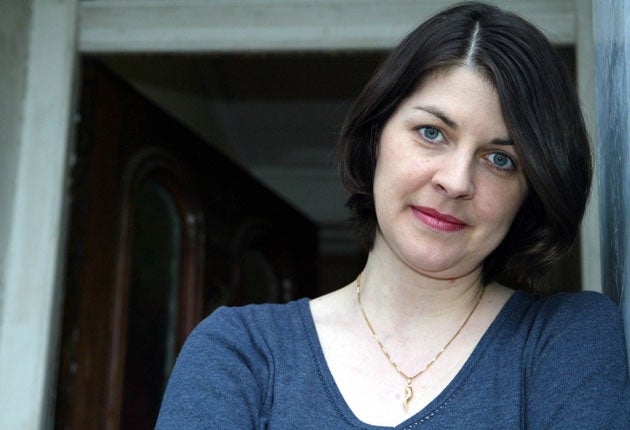All the Globe's a stage – even for women writers
As Shakespeare's theatre opens its doors today for the first time to a play by a female writer, Rachel Shields reports on a wider theatrical revolution

They aren't so much smashing through the glass ceiling as sweeping aside layers of dusty parchment; but it is progress. As the first play penned by a woman opens at Shakespeare's Globe today – breaking a 411-year tradition – top theatre directors report a surge in prominent female playwrights, with a wave of talented women coming to the fore in Britain's male-dominated theatres.
Nell Leyshon will make history at the Globe in central London with her new play Bedlam, which chronicles the goings on at London's notorious Bethlem psychiatric hospital in the 18th century. Following the story of a young country girl admitted to the asylum, the dark comedy looks at the terrible treatments administered to unfortunate inhabitants, and the gin craze that was sweeping London.
That the 48-year-old Leyshon, who is also a successful radio playwright and novelist, has cracked the Globe is seen as a symbolic breakthrough for women theatre writers.
"The Globe is the home of Shakespeare and at the heart of our theatre culture, which excluded women for such a long time, so it is particularly poignant," said Sue Parrish, artistic director of the feminist theatre company Sphinx.
Shakespeare both wrote for and was a shareholder in the first Globe, which opened in 1599 but burnt down in 1613. The latest incarnation opened in 1997 about 200 metres from the site of the original theatre.
Leyshon is just one of the female playwrights coming to the fore; others include Lucy Prebble, author of the phenomenally successful Enron; Polly Stenham, the precocious author of That Face; Moira Buffini, whose Welcome to Thebes ran at the National's Olivier this summer; and the prolific Lucy Kirkwood.
"They say you have to act like a man to succeed, and you do have to project confidence," said Leyshon. "We women do have a lot to learn, especially when it comes to expressing self-doubt. Playwriting is quite gladiatorial. The success or failure is public, and you can't turn away from that."
She also believes that women are benefiting from the "snowball" effect, and are being spurred on by each other's success: "When you have women who do it, you get a build-up of self-belief."
Dominic Dromgoole, artistic director of the Globe, said: "There was a rather dull masculinity which was in favour in the 1990s. That was the fashion then, but women seem to be coming back in at the moment.
"There is a discreet amount of positive discrimination, but, really, you just want to commission the best playwrights."
More established female playwrights are also enjoying a moment in the sun. While Sarah Kane's Blasted was dismissed by critics as "immature" when it opened in 1995, it is now regarded as a seminal work, and is having its first revival in 10 years this October at the Lyric in London.
"There is a wave of women writers at the moment who are really talented and successful," said Parrish. There is a window of opportunity which has come about through a confluence of factors."
As reasons for the shift, she cited an increase in the number of schemes targeting emerging writers; wider activity by feminist groups highlighting gender imbalances in British workplaces; and the work of Harriet Harman, when she was minister for women, pushing equality legislation. She also linked the high-profile push at the Royal Court in the 1980s to increase the number of plays written by women to growing feminist pressure in the late 1970s.
Despite this, women writers still have a long way to go. A report published last year by the theatre group Sphinx found that only 17 per cent of performed plays are written by women.
While most pronounced within theatre, this gender imbalance is notable throughout the arts, with women making up 23 per cent of theatre directors, 28 per cent of television writers and only 9 per cent of film directors.
"The dearth of women in leadership roles limits the depth and breadth of cultural output, which has an impact on wider social trends and attitudes," said Ceri Goddard, chief executive of the Fawcett Society. "The lack of women in this sector is no less important than in politics or the law, and should be addressed with equal vigour."
Lucy Kirkwood
The prolific 26-year-old has tackled a range of subjects, from the horrors of war, in 'Guns or Butter', to sex-trafficking and a version of Ibsen's 'Hedda Gabler'.
Nell Leyshon
Leyshon's 'Bedlam' is the first play by a female writer at the Globe. Also a radio dramatist and novelist, her first novel was long-listed for the Orange Prize.
Moira Buffini
Buffini writes for stage and screen, most recently penning 'Welcome to Thebes', a retelling of a Greek play set during a civil war in contemporary Africa.
Polly Stenham
Stenham left University College London in 2007 to concentrate on her first play, 'That Face', which won rave reviews. Her follow-up, 'Tusk Tusk', was also a hit.
Lucy Prebble
The twentysomething from Surrey made her name in 2009 with the award-winning 'Enron', and is also the creator of the hit TV show 'Secret Diary of a Call Girl'.
Subscribe to Independent Premium to bookmark this article
Want to bookmark your favourite articles and stories to read or reference later? Start your Independent Premium subscription today.

Join our commenting forum
Join thought-provoking conversations, follow other Independent readers and see their replies